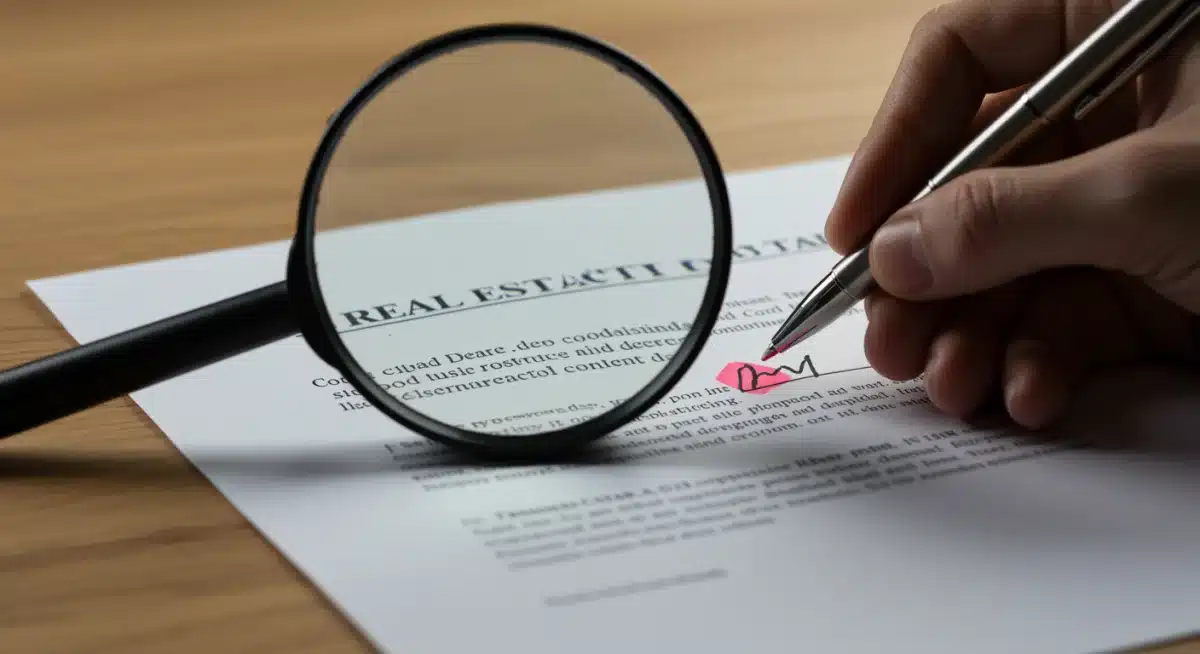Consumer Recourse: Real Estate Deals Gone Wrong in 2025

Navigating real estate deals gone awry in 2025 requires understanding your consumer recourse options, outlining legal protections, dispute resolution, and safeguarding your interests in the dynamic U.S. property market with clarity and precision.
Consumer Recourse: What to Do When a Real Estate Deal Goes Wrong in 2025 is a critical concern for buyers and sellers in today’s evolving market. As real estate transactions become increasingly complex, understanding your rights and available remedies when issues arise is paramount. This guide provides timely, factual information on navigating disputes and securing your investment.
Understanding the Evolving Real Estate Landscape in 2025
The real estate market in 2025 continues its dynamic trajectory, influenced by technological advancements, updated regulations, and shifting economic conditions. These factors contribute to both opportunities and potential pitfalls for consumers. Staying informed about the current environment is the first step in effective consumer recourse.
Key changes in contract law and disclosure requirements have been implemented to enhance transparency, yet missteps can still occur. Buyers are increasingly utilizing advanced digital tools for property search and evaluation, which also introduces new considerations regarding digital representations and their accuracy. Sellers, meanwhile, face heightened expectations for disclosures and property condition reports, especially with the accelerated pace of transactions in some markets.
Technological Impacts on Real Estate Transactions
- AI-driven Valuations: While offering speed, AI valuations can sometimes miss nuanced property details, leading to disputes over fair market value.
- Smart Contracts: The rise of blockchain-based smart contracts aims to streamline transactions, but understanding their legal enforceability and dispute mechanisms is crucial.
- Virtual Tours and Digital Disclosures: Relying solely on virtual tours can lead to discrepancies upon physical inspection, making clear documentation of digital representations vital.
The complexity introduced by these innovations means that while transactions might seem smoother, the potential for misunderstandings or misrepresentations remains. Recognizing these modern challenges is essential for anyone seeking consumer recourse when a real estate deal goes wrong in 2025.
As the market adapts, consumers must be vigilant. The interplay of traditional real estate practices with cutting-edge technology necessitates a proactive approach to due diligence and understanding contractual obligations. This evolving landscape underscores why a clear understanding of consumer recourse mechanisms is more important than ever for protecting your interests.
Common Scenarios Leading to Real Estate Disputes
Real estate transactions, by their very nature, involve substantial financial commitment and intricate legal agreements, making them ripe for potential disputes. In 2025, several common scenarios continue to trigger disagreements between parties, often requiring consumer recourse to resolve.
These issues can range from undisclosed property defects to breaches of contract terms, each carrying significant financial and emotional weight for those involved. Understanding these frequent problems helps in both prevention and preparation for effective resolution. The complexity of property law means that even minor misunderstandings can escalate into major legal challenges if not addressed promptly and correctly.
Undisclosed Property Defects
One of the most frequent causes of disputes involves sellers failing to disclose significant defects that impact the property’s value or safety. This can include structural issues, water damage, pest infestations, or problems with major systems like HVAC or plumbing.
- Seller’s Disclosure Obligations: Laws in many states mandate sellers to disclose known material defects. Failure to do so can lead to legal action.
- Buyer’s Due Diligence: While sellers have obligations, buyers are also expected to conduct thorough inspections. However, latent defects not discoverable by reasonable inspection remain the seller’s responsibility if known and undisclosed.
- Impact of “As-Is” Clauses: Even with “as-is” clauses, sellers typically cannot avoid liability for fraudulent misrepresentation or concealment of known defects.
When such defects come to light post-closing, buyers often seek consumer recourse, typically demanding compensation for repairs or, in severe cases, rescission of the contract. The timing of discovery and the nature of the defect are critical factors in determining the strength of such claims.
Breach of Contract and Failure to Perform
A real estate contract is a legally binding agreement, and failure by either party to uphold their obligations constitutes a breach. This can manifest in various ways, from a buyer failing to secure financing to a seller backing out of the deal without proper justification.
Common examples include a buyer backing out after removing contingencies, a seller refusing to complete agreed-upon repairs, or either party failing to meet deadlines specified in the purchase agreement. These breaches can cause significant financial harm and inconvenience, necessitating legal intervention to enforce the contract or seek damages.
When a party fails to perform as agreed, the non-breaching party has several options for consumer recourse, including specific performance (forcing the sale or purchase to proceed), monetary damages for losses incurred, or rescission of the contract. The specific remedy depends on the terms of the contract and the nature of the breach.
Initial Steps for Consumer Recourse
When a real estate deal begins to sour, prompt and informed action is crucial. The initial steps taken can significantly influence the outcome of any potential dispute. Before considering formal legal action, there are several practical measures consumers should undertake to protect their interests and build a strong case for consumer recourse.
Documenting everything, understanding your contract, and attempting direct communication are foundational strategies. These steps help clarify the situation, preserve evidence, and potentially resolve issues without the need for extensive litigation, saving both time and resources. Early intervention can often prevent minor disagreements from escalating into complex legal battles.

Documenting Everything
Comprehensive documentation is the bedrock of any successful consumer recourse effort. Every communication, agreement, and observation related to the transaction should be meticulously recorded.
- Keep Detailed Records: Maintain copies of all contracts, addendums, disclosures, inspection reports, repair invoices, and financial statements.
- Log Communications: Document all correspondence, including emails, text messages, and notes from phone calls or in-person meetings. Include dates, times, participants, and summaries of discussions.
- Photograph and Video Evidence: If the dispute involves property condition, take dated photographs and videos of any defects or issues as soon as they are discovered.
This organized collection of evidence will be invaluable if you need to pursue legal action or mediation. It provides clear, verifiable facts that support your claims and refutes counter-arguments, strengthening your position for consumer recourse.
Reviewing Your Contract Thoroughly
Your real estate contract is the definitive guide to your rights and obligations. Before taking any action, review it carefully to understand the terms, conditions, and any clauses pertaining to dispute resolution.
Pay close attention to contingency clauses (e.g., financing, inspection, appraisal), default provisions, and any language regarding remedies for breach. Many contracts include specific procedures for mediation or arbitration before litigation. Understanding these provisions will help you navigate the appropriate next steps for consumer recourse.
Consulting with an attorney at this stage can help you interpret complex legal language and identify potential avenues for resolution outlined within the contract itself. This review is critical to understanding the legal framework governing your specific situation.
Legal Avenues for Resolution
When initial attempts at resolution fail, consumers must explore formal legal avenues to address real estate disputes. In 2025, these options typically include mediation, arbitration, and litigation, each with distinct processes, costs, and potential outcomes for consumer recourse. Choosing the right path depends on the specifics of the dispute, the contractual agreements, and the desired outcome.
Understanding the differences between these legal strategies is crucial for making informed decisions and effectively pursuing your claim. Legal professionals play a vital role in guiding consumers through these complex processes, ensuring their rights are protected and the best possible resolution is achieved.
Mediation and Arbitration
Many real estate contracts in 2025 include clauses mandating alternative dispute resolution (ADR) before litigation. Mediation and arbitration are two primary forms of ADR, offering less formal and often quicker alternatives to court proceedings.
- Mediation: A neutral third party (mediator) facilitates communication and negotiation between disputing parties to help them reach a mutually acceptable settlement. The mediator does not make a decision but guides the discussion. Mediation is non-binding unless a settlement agreement is signed.
- Arbitration: A neutral third party (arbitrator) hears evidence and arguments from both sides and then renders a binding decision, similar to a court judgment. Arbitration is typically less formal than a trial but more formal than mediation, and the arbitrator’s decision is usually final and difficult to appeal.
These methods can be cost-effective and preserve relationships, making them attractive options for consumer recourse. They are particularly effective when both parties are willing to engage constructively to find a resolution.
Litigation: Suing for Damages or Specific Performance
If ADR fails or is not stipulated in the contract, litigation through the court system becomes the primary legal avenue. This involves filing a lawsuit to seek a court order for damages, specific performance, or contract rescission.
Damages: The most common form of relief, aiming to compensate the injured party for financial losses suffered due to the breach or defect. This can include repair costs, lost profits, or differences in property value.
Specific Performance: In real estate, courts may order specific performance, compelling the breaching party to fulfill the terms of the contract (e.g., forcing a seller to sell the property). This is often sought when monetary damages are insufficient to make the injured party whole.
Contract Rescission: This remedy aims to undo the contract, returning both parties to their original positions as if the contract had never been formed. This might involve returning deposits and voiding the sale.
Litigation is typically the most time-consuming and expensive option for consumer recourse. It requires extensive legal preparation, evidence presentation, and adherence to court procedures. A skilled real estate attorney is indispensable for navigating this complex process effectively.
Consumer Protection Laws and Agencies
In 2025, a robust framework of consumer protection laws and dedicated agencies exists at both federal and state levels to safeguard individuals in real estate transactions. These laws provide additional layers of consumer recourse beyond contractual remedies, particularly when issues involve unfair or deceptive practices by industry professionals.
Understanding which laws apply and which agencies can offer assistance is vital for consumers facing difficulties. These protections aim to ensure fair dealing, transparency, and accountability within the real estate market, offering avenues for redress that might not be available solely through contract law.

Federal and State Consumer Protection Acts
Various statutes provide broad protections against deceptive practices. The Federal Trade Commission (FTC) enforces federal consumer protection laws, while individual states have their own consumer protection acts that often provide more specific remedies for real estate-related issues.
- Deceptive Trade Practices Acts (DTPAs): Many states have DTPAs that prohibit misleading or fraudulent actions in commerce, including real estate. These acts often allow consumers to recover treble damages and attorney’s fees.
- Real Estate Settlement Procedures Act (RESPA): A federal law that protects consumers from abusive practices in the real estate settlement process, requiring disclosures about settlement costs and prohibiting certain practices like kickbacks.
- Truth in Lending Act (TILA): Another federal law that ensures consumers are fully informed about the costs of borrowing, particularly in mortgage transactions, preventing predatory lending practices.
These laws empower consumers to seek recourse against brokers, lenders, or developers who engage in misrepresentation, fraud, or other unlawful conduct. Knowledge of these protections can significantly strengthen a consumer’s position when a real estate deal goes wrong in 2025.
Regulatory Bodies and Licensing Boards
Beyond legal action, consumers can also seek assistance from governmental and professional regulatory bodies. These agencies oversee real estate professionals and can investigate complaints, imposing sanctions or disciplinary actions against licensees who violate ethical standards or laws.
State Real Estate Commissions or Boards license real estate agents, brokers, and appraisers. If a dispute arises due to professional misconduct, filing a complaint with the relevant licensing board can lead to disciplinary action against the professional, which may include fines, license suspension, or revocation. While these complaints typically do not result in direct financial compensation for the consumer, they can be an effective way to hold professionals accountable and contribute to the overall integrity of the industry.
Additionally, the Consumer Financial Protection Bureau (CFPB) handles complaints related to mortgages and other financial products. Reporting issues to these agencies can trigger investigations and provide valuable support for consumer recourse efforts.
Preventative Measures for Future Transactions
Learning from past experiences is invaluable, especially when a real estate deal goes wrong. Implementing strong preventative measures in future transactions can significantly reduce the risk of encountering similar issues. In 2025, proactive due diligence, comprehensive contract review, and professional guidance are more critical than ever.
These strategies empower consumers to approach real estate dealings with confidence, minimizing vulnerabilities and ensuring smoother, more secure outcomes. The goal is not just to know how to seek consumer recourse, but how to avoid needing it in the first place.
Thorough Due Diligence and Professional Inspections
Before committing to any real estate purchase, conducting exhaustive due diligence is paramount. This involves more than just a cursory look at the property.
- Professional Home Inspection: Always hire a certified home inspector to uncover any structural, mechanical, or safety issues. Do not waive this contingency, even in a competitive market.
- Specialized Inspections: Depending on the property’s age or location, consider specialized inspections for pests, mold, radon, septic systems, or lead-based paint.
- Title Search: Ensure a thorough title search is conducted to identify any liens, easements, or encumbrances that could affect your ownership rights.
A comprehensive understanding of the property’s condition and legal status upfront can prevent costly surprises and disputes down the line, thereby reducing the need for consumer recourse.
Engaging Experienced Real Estate Professionals
The expertise of qualified professionals is indispensable in navigating the complexities of real estate. Their guidance can prove to be the best form of prevention.
Experienced Real Estate Agent: Choose an agent with a strong track record, local market knowledge, and excellent references. They should represent your interests exclusively and guide you through the process, identifying potential red flags.
Real Estate Attorney: While not always legally required in all states for simple transactions, having a dedicated real estate attorney review all contracts and closing documents is highly recommended. An attorney can spot unfavorable clauses, ensure legal compliance, and advise on potential risks, offering invaluable protection for consumer recourse.
These professionals act as your advocates, providing expert advice and helping you make informed decisions, thereby significantly mitigating the chances of a real estate deal going wrong in 2025.
The Role of Insurance and Warranties
In 2025, insurance and warranties serve as crucial financial safeguards in real estate transactions, offering a layer of protection when unforeseen issues arise. While not directly a form of consumer recourse in the legal sense, they provide financial remedies that can mitigate losses and cover repair costs, often preventing the need for costly legal battles. Understanding their scope and limitations is vital for comprehensive protection.
These instruments can be particularly beneficial when dealing with defects or failures that become apparent after closing, offering a more straightforward path to resolution than pursuing a breach of contract claim. They represent a proactive approach to risk management in property ownership.
Home Warranties and Their Coverage
Home warranties are service contracts that cover the repair or replacement of major home systems and appliances that break down due to normal wear and tear. These are distinct from homeowner’s insurance, which covers damage from perils like fire or theft.
- Typical Coverage: Includes HVAC systems, plumbing, electrical systems, water heaters, and major kitchen appliances. Coverage specifics vary significantly by provider and plan.
- Benefits for Buyers: Provides peace of mind, especially when purchasing an older home, by protecting against unexpected repair costs in the first year or more of ownership.
- Seller-Provided Warranties: Sometimes sellers offer a home warranty to buyers as an incentive or to reduce their liability for post-sale issues, making it a valuable part of consumer recourse consideration.
While home warranties have limitations, such as coverage caps and service fees, they can be an effective way to address issues with major components, offering a practical form of consumer recourse for functional failures within the covered period.
Title Insurance: Protecting Your Ownership
Title insurance is a critical form of protection for both buyers and lenders, safeguarding against financial loss due to defects in the title to a property. Such defects can include undisclosed liens, encumbrances, or errors in public records that could challenge ownership.
Unlike other forms of insurance, title insurance covers events that happened in the past, prior to the purchase of the property. It is typically a one-time premium paid at closing, offering protection for as long as you own the property.
When a title defect is discovered, title insurance will either cover the legal costs to defend your ownership or compensate you for the financial loss, up to the policy’s limits. This is an indispensable form of consumer recourse, ensuring that your property ownership rights are secure and providing a financial backstop against unforeseen title issues that could otherwise derail your investment.
Key Aspect |
Brief Description |
|---|---|
Documentation |
Crucial for all communications and evidence to support your claim. |
Contract Review |
Understand terms, contingencies, and dispute resolution clauses. |
Legal Avenues |
Mediation, arbitration, or litigation for formal dispute resolution. |
Preventative Steps |
Thorough due diligence, inspections, and professional guidance. |
Frequently Asked Questions About Real Estate Recourse
▼
A real estate deal “gone wrong” typically refers to situations where one party breaches the contract, material defects are undisclosed, or fraud occurs. This can include issues like a seller backing out, buyer financing falling through, or significant property damage discovered post-closing that was not disclosed.
▼
It is highly advisable to consult with a real estate attorney as soon as a significant issue emerges. Early legal advice can help you understand your rights, obligations, and the best course of action, potentially preventing further complications and strengthening your position for consumer recourse.
▼
Mediation involves a neutral third party helping disputing parties reach a mutually agreeable settlement, which is non-binding until signed. Arbitration involves a neutral third party making a binding decision after hearing both sides, similar to a court judgment but less formal.
▼
Even with an “as-is” clause, sellers generally cannot avoid liability for fraudulent misrepresentation, active concealment of known defects, or failure to disclose issues required by law. You may still have avenues for consumer recourse, but it often requires legal consultation to assess the specifics.
▼
Preventative measures include thorough due diligence, comprehensive professional inspections, careful review of all contract terms, and engaging experienced real estate agents and attorneys. These steps significantly reduce risks and enhance transaction security.
What This Means for Real Estate Consumers
The landscape of real estate transactions in 2025 demands vigilance and informed action from consumers. Understanding your rights and the available avenues for consumer recourse is not merely a reactive measure but a proactive strategy for protecting your substantial investments. The insights provided here underscore the importance of meticulous preparation, diligent documentation, and timely legal consultation when a real estate deal goes wrong. As the market continues to evolve, staying abreast of legal shifts and technological impacts will remain crucial for navigating property transactions successfully and mitigating potential risks.





